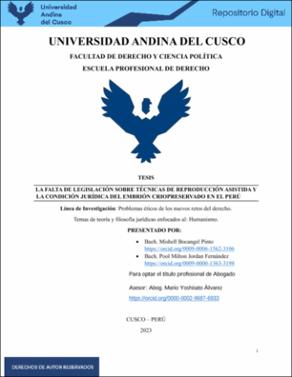| dc.contributor.advisor | Yoshisato Álvarez, Mario | |
| dc.contributor.author | Bocangel Pinto, Mishell | |
| dc.contributor.author | Jordan Fernández, Pool Milton | |
| dc.date.accessioned | 2024-04-18T20:18:54Z | |
| dc.date.available | 2024-04-18T20:18:54Z | |
| dc.date.issued | 2023-12-19 | |
| dc.identifier.uri | https://hdl.handle.net/20.500.12557/6250 | |
| dc.description.abstract | La presente tesis de investigación va referida a la falta de legislación sobre TRHA y la
condición jurídica del embrión criopreservado en el Perú, en nuestro país las TRHA son aplicadas
desde 1950 antes de que naciera el primer niño producto de una Fecundación In Vitro (FIV) que
fue en 1978 en Reino Unido, entonces vemos que nuestro país no es ajeno a los avances de la
biotecnología, por lo que en el presente trabajo de investigación se analiza la condición o situación
jurídica del embrión criopreservado frente a nuestra legislación, se profundiza porque es
importante que se establezca la condición jurídica de este tipo de embrión y viendo la necesidad
de una adecuada regulación acerca del tema, se propone la modificación del artículo 7 de la Ley
General de Salud N° 26842, así como se da una propuesta sobre cómo podría regularse al embrión
criopreservado. Por tanto, el proceso metodológico de este trabajo de investigación es de enfoque
cualitativo, se aplicó como técnica de investigación el análisis documental y la entrevista a un
experto en la materia de TRHA, como instrumentos se usó la guía de análisis documental y guía
de entrevista no estructurada.
De este modo la investigación tuvo como resultados que la condición jurídica del embrión
criopreservado es incierta, sin embargo, si tomamos en cuenta que el concebido es desde la
fecundación el embrión in vitro se puede entender que es igual que el embrión en el útero de la
mujer, no obstante, debemos aclarar que el embrión criopreservado merece una regulación especial
por su condición. | es_PE |
| dc.description.abstract | The present research thesis refers to the lack of legislation on HRT and the legal status of
the cryopreserved embryo in Peru. In our country, HRT has been applied since 1950 before the
first child was born as a result of In Vitro Fertilization (IVF) in 1978 in the United Kingdom, so
we see that our country is not alien to the advances of biotechnology, Therefore, in this research
work we analyze the legal status or situation of the cryopreserved embryo in our legislation, we
go deeper into why it is important to establish the legal status of this type of embryo and seeing
the need for an adequate regulation on the subject, we propose the modification of Article 7 of the
General Health Law No. 26842, as well as a proposal on how the cryopreserved embryo could be
regulated. Therefore, the methodological process of this research work is of qualitative approach,
the research technique applied was documentary analysis and interview with an expert on the
subject of HRT, and the instruments used were the documentary analysis guide and the
unstructured interview guide.
Thus, the results of the research were that the legal status of the cryopreserved embryo is
uncertain, however, if we take into account that the conceived is from the moment of fertilization
the embryo in vitro, it can be understood that it is the same as the embryo in the woman's uterus,
however, we must clarify that the cryopreserved embryo deserves a special regulation due to its
condition. | en_US |
| dc.format | application/pdf | es_PE |
| dc.language.iso | spa | es_PE |
| dc.publisher | Universidad Andina del Cusco | es_PE |
| dc.rights | info:eu-repo/semantics/openAccess | es_PE |
| dc.rights.uri | https://creativecommons.org/licenses/by-nc-nd/4.0/ | es_PE |
| dc.subject | Embrión criopreservado | es_PE |
| dc.subject | Técnicas de reproducción humana asistida | es_PE |
| dc.subject | Fecundación in vitro | es_PE |
| dc.subject | Condición jurídica | es_PE |
| dc.title | La falta de legislación sobre técnicas de reproducción asistida y la condición jurídica del embrión Criopreservado en el Perú | es_PE |
| dc.type | info:eu-repo/semantics/bachelorThesis | es_PE |
| thesis.degree.name | Abogado | es_PE |
| thesis.degree.grantor | Universidad Andina del Cusco. Facultad de Derecho y Ciencia Política | es_PE |
| thesis.degree.discipline | Derecho | es_PE |
| dc.publisher.country | PE | es_PE |
| dc.subject.ocde | https://purl.org/pe-repo/ocde/ford#5.05.00 | es_PE |
| renati.advisor.dni | 23845777 | |
| renati.advisor.orcid | https://orcid.org/0000-0002-9687-6933 | es_PE |
| renati.author.dni | 72194199 | |
| renati.author.dni | 71256522 | |
| renati.discipline | 421016 | es_PE |
| renati.juror | Chuquimia Hurtado, José | |
| renati.juror | Calvo Rodriguez, Yuri | |
| renati.juror | Pozo Roldán, Clorinda | |
| renati.juror | Quispe Ayala, Yesenia | |
| renati.level | https://purl.org/pe-repo/renati/level#tituloProfesional | es_PE |
| renati.type | https://purl.org/pe-repo/renati/type#tesis | es_PE |
| dc.description.lineadeinvestigacion | Problemas éticos de los nuevos retos del derecho. Temas de teoría y filosofía jurídicas enfocados al: Humanismo | es_PE |




